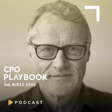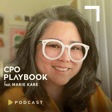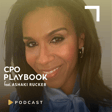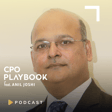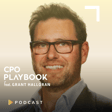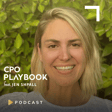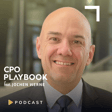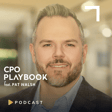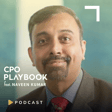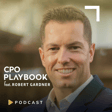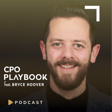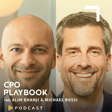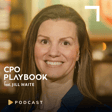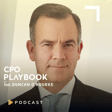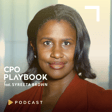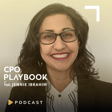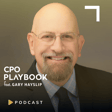Introduction to CPO Playbook
00:00:02
Speaker
I'm Felicia Shakiba, and this is CPO Playbook, where we solve a business challenge in every episode.
The Financial Impact of Creativity
00:00:15
Speaker
When McKinsey looked at the financial results of companies whose award creativity scores were in the top quartile, they found they performed better than peer firms on three key measures. One of them being that 67% had above average organic revenue growth.
00:00:33
Speaker
The absence of creativity poses a significant problem for businesses as it hampers innovation, a key driver of growth. Sidelining creativity stifles a company's ability to innovate and succeed in a competitive market. To address this issue, businesses should focus on prioritizing creativity in daily operations, fostering a deep understanding of customer needs beyond traditional methods, embracing agility to swiftly act on insights.
Meet Danielle Lamar of Cirque du Soleil
00:01:01
Speaker
Our guest today is a genius at transforming creativity into unparalleled riches. Executive vice chairman of the board at Cirque du Soleil, Danielle Lamar. Danielle, thank you so much for being with us today. You're welcome. It's a pleasure to have the opportunity to talk about my favorite topic, Cirque du Soleil.
00:01:27
Speaker
Could you share a pivotal moment or story from your journey in co-creating Cirque du Soleil that reflects the importance of creativity in business? Yep. First of all, when I joined the organization in 2000, that company was ready to emerge.
00:01:48
Speaker
and the brand was ready to explode internationally.
Fostering Creativity Across Departments
00:01:53
Speaker
And my contribution to the creativity of the company was to take the creativity that was already well located within our show department and nurture that creativity throughout the entire organization. Because that was important for me, that you're not only creative,
00:02:16
Speaker
when you produce a new show, but you have to be creative, whatever you do in the organization. It doesn't matter if you work in human resources or finance or legal, you can always be creative by bringing in new ways of doing what you do in life. And that's why I often say to people that doesn't matter in what sector of activity you're working, you have to be creative.
00:02:44
Speaker
How did you spark that creativity when you came into the company in 2000? Yeah, I tried to send a clear signal to the team.
Lessons from Kodak and Apple
00:02:55
Speaker
I remember one day the vice president of creation walked in my office and he was very excited and he says, Daniel, you won't believe this. There is this teacher in Switzerland that has invented drawl that we can use in our new shows.
00:03:12
Speaker
And I look at him and I said, what are you doing in my office? And he says, Daniel, you don't like my idea. I said, I love your idea, but take the next plane to Switzerland, meet with this teacher and bring back the drone because that will be awesome to have it in our new show.
00:03:32
Speaker
Guess what? An hour later, everybody in the building knew that I have said that. And that's the way by sending clear signal to your people.
00:03:43
Speaker
that you are open to new ideas, that's how you can nurture creativity within your organization. In your experience, what are the key factors that differentiate companies that successfully leverage creativity from those that struggle to do so? First thing is to be open to new idea. I'll give you an example. For instance, Kodak. Kodak at the time
00:04:12
Speaker
knew and they had the digital technology. But guess what? He says, no, no, no, no, no, never, ever, ever will people watch photographs on their telephone. People have to have paper to have their album of photographs. Guess what?
Balancing Creativity with Business Constraints
00:04:34
Speaker
Kodak doesn't exist anymore.
00:04:36
Speaker
And at the other spectrum of creativity, you have a company like Apple that never stopped reinventing themselves. And to me, I like to say to people, without creativity, there is no business. And I truly believe that. Because if you take a show of Cirque du Soleil, if you have a great show, you have a great business. If you don't have a good show, you have no business.
00:05:06
Speaker
And I can see how that moves into other industries, even a fintech company constantly reinventing itself like a Cirque du Soleil show, if you will. Apple, I thought, was a great example. I know that Cirque du Soleil is known for its unique blend of artistry and business acumen. So how do you balance creativity and commercial success within the company?
00:05:35
Speaker
Yeah, obviously, it is a balancing act, as I like to say, because on one end, you have the creators that never have enough money. They could spend forever. On the other end, you have the business people that say that we are investing too much money in a new show. So what's important is that the creators, the team that is developing a new show,
00:06:03
Speaker
understand what are the business parameters. And if you define clearly with the entire team what those parameters are, then you, at the end of it, establish the sandbox within which our creators can work. So I will tell them you will have total freedom
00:06:28
Speaker
within that sandbox, but you have to respect the business parameters that we have because otherwise it won't work. So what does that include? Does that include a timeline or budget or how do you set those parameters?
00:06:46
Speaker
Yeah, first and foremost, you have to give a very clear mandate to your artists and creators. So you have to be very specific about the timing, the budget, but also about what kind of music you're looking for, what kind of costume you're looking for. So that when you do your check-in that is happening every second month, the game is very clear for everybody.
00:07:14
Speaker
They know what we're going to be looking for, what we're going to evaluate in the end product that they're going to present to us.
00:07:26
Speaker
So having clear and specific parameters and then being able to tell people you're free to do it within those parameters provides that balance of creativity and structure in order to move forward with the business acumen, is what you're saying. That's what I'm saying, exactly.
00:07:47
Speaker
And so what advice would you offer to CEOs or executives looking to infuse creativity into their strategies to stand out and outperform their competitors?
00:07:59
Speaker
I think it's very important that they define clearly the mandate and they also communicate it to their team. And then if the vision is very, very clear, then it will be much easier for the team to execute based on the vision that we are looking for. You have to have also a very clear creative process. So you have to make your team understanding that
00:08:29
Speaker
Here's the mandate. Come back to us with a concept. Let's have regular checkpoint when we are going to evaluate the kind of progress that you are doing. And that, to me, is very, very important with very clear TPI. It's very, very important also that creators, artists are measured
00:08:53
Speaker
maybe in a different way, but that our measure, like any other people in any other services within the organization, are our measure. The other thing, it might sound a little bit funny, but to me it's very important, is you also have to celebrate success.
The Importance of Risk-Taking
00:09:11
Speaker
It's very important that when you have a success, in our case, having a great show that is working, that you pay tribute to the team that brought that success to the company. And by the same token, you also have to be able to understand failures. Having a failure is part of life, and it's not that bad to have a failure if you learn from your failure.
00:09:40
Speaker
What is very bad is if you have a failure that you try to hide it under the carpet and ignore it. And in our situation, we like to take the time to understand if we have a failure, what we did.
00:09:55
Speaker
I'm so glad that you brought that up, especially in startups. Failing fast is this phrase that they use often. And startups, probably more so than legacy older companies, need to be reinventing themselves in order to stand out and get market share. And so this concept of failing fast is so pivotal in their world
00:10:23
Speaker
Yet, how do you take a company that might have a very certain way of doing things, has done certain things in a way that has made them successful today, and perhaps failing could be shunned upon, if you will. How many companies get through that? It's like a whole mindset change, if you know what I'm saying.
00:10:51
Speaker
Again, if you want to be relevant, not only tomorrow, but in five years from now or 10 years from now, you have to be able to look at yourself and ask yourself, where do I want to be in five years from now? And then it will tell you very early in your reflection that you need to take risks.
00:11:14
Speaker
And by taking risks, yes, you will have some failure, but that's the price to pay in order to remain healthy. In order to have your people, when they wake up in the morning, they know why they're waking up because they have a purpose
Turning Collaboration Challenges into Success
00:11:31
Speaker
in life. And their purpose is to bring your organization to the next level.
00:11:36
Speaker
And if you don't have that mentality of reinventing yourself all the time, one day by being complicit, you're going to disappear. It's as simple as that. How do you as an executive nurture failure or risk to the point where you're breeding creativity, but you're not encouraging people to not hit the mark?
00:12:03
Speaker
I think there is only one way is to acknowledge your failure. Because again, people don't want to talk about their failure. And obviously you have to have more successes than failure in life. But when you have a failure, you should acknowledge it and share it with your people and more importantly, share the learnings of your failure.
00:12:26
Speaker
understood and being an example for the team. Could you discuss a particular challenge that you faced while fostering creativity and how did you overcome it? Yeah, I remember one day we had a very successful show at Downtown Disney in Orlando. And after 15, 18 years, Disney said, so we're going to close that show and you can keep the theater if you decide that
00:12:56
Speaker
you were able to do a show with Disney IP. And that was a shock internally because people were saying, we don't want to have Disney characters to do acrobatics acts or stuff like that. And there was a lot of controversy here internally at surf. And then I said, stop thinking negatively about that idea.
00:13:19
Speaker
We have been able to do a tribute to the Beatles. We have been able to do a tribute to Michael Jackson. Why don't we look at Disney the same way? And then our creators came to this idea of saying, what is the most noble art of Disney?
00:13:39
Speaker
And that is Disney animation because that's where everything starts with the founder of Disney. And then we have done a show which was paying a tribute to Disney animation. So we turn this negative situation to an amazing positive environment where everybody internally wanted to be involved with that.
00:14:02
Speaker
because it reminds them that there was in the culture of Disney something that was quite similar to ours. So that's, to me, a good example of putting a problem on the table and saying, how can I creatively come with a solution that will be innovative? And that's what we did.
00:14:27
Speaker
Wow, just thinking about that makes me want to go see the show. You should, because it's a great show. It's called Drawn to Life, and it's amazing because it's the best of Disney, which is great images of their legacy in terms of animation. And then in the forefront, having the Acrobatic Acts, which is the best portion of Cirque du Soleil.
00:14:51
Speaker
Well, that's incredible. Cirque du Soleil has redefined entertainment through innovation, clearly. How important do you think continuous innovation is in sustaining a company's success, especially in rated industries?
00:15:08
Speaker
It is essential. It is very essential for us. People will be surprised to see how much investment we do in research and development, how much we're in the lookout all the time.
00:15:22
Speaker
for new technologies in order to innovate. We also like to work with great partners. Working with the Beatles was an amazing experience because those people are amazing creators and they have a process which is different than ours because they're in the music business, we're in the live business, but working together was amazing. So just to summarize my thoughts here.
00:15:50
Speaker
It's very, very important that you look to different ways to remain relevant. So it means new technologies, R&D, being in the lookout all the time for what's going on in your industry. And it also means being in touch with amazing creators, having the opportunity for instance to work with James Cameron. Cameron learned me an amazing, simple lesson.
00:16:19
Speaker
If you come here in the creative studio at Cirque du Soleil, and I invite you to visit our studios, it will probably take you an hour and a half. When James Cameron came to visit the studio, it took him five and a half hours. He couldn't stop asking questions to technicians, to the creators, to the artists. He wanted to know everything about everything.
00:16:49
Speaker
So we all like to say that curiosity is very important. It's part of nurturing your creativity, but the way this guy operates, it's not a coincidence why he has been so successful with Avatar because he has invented literally a new camera to shoot his movie.
00:17:14
Speaker
It is to me the epitome of what curiosity is all about. But to me, it is at the basis being creative.
Diversity and Innovation at Cirque du Soleil
00:17:24
Speaker
I think curiosity plays an incredible role in creativity. How much does diversity or equity or inclusion contribute, do you think, to the creative thought process?
00:17:39
Speaker
Yeah, it's interesting because today diversity is the new flavor of the month or of the year or of the decade. But at Cirque, we never talk about diversity because we are diversity. We have 90 different nationalities
00:17:55
Speaker
represented within Cirque du Soleil. And if you would ask me what is one of the main strengths of this organization, that's what it is. Because when you bring people, let's say the new show, and you bring creators from 20 different countries working together, the richness of their personal background, their culture. So at the end of it,
00:18:22
Speaker
Because we bring so many nationalities working together, the ultimate results, which is the show,
00:18:31
Speaker
become globally relevant because of that. And I think that's one of the strengths of our organization. And that's why we have been embracing diversity forever. How do you encourage risk taking and experimentation? And this is a billion dollar industry while ensuring a level of stability and reliability in business operations.
00:18:58
Speaker
Yeah, obviously everybody wants to succeed and we keep pushing and encouraging people to succeed. I remember one day we were developing this amazing mechanical horse and we paid the millions of dollars to have it in our show. And unfortunately it didn't work out.
00:19:21
Speaker
The horse was too big, it was too complicated, and it was not enhancing the show. It was destroying. So I said to the guys, I said, first, it's out of our show.
00:19:34
Speaker
Second, you're going to take this gigantic horse and you're going to bring it in our creative place and you're going to expose it. If you walk in our creative center right now, you will see this huge
00:19:52
Speaker
a mechanical horse, and it's a reminder to people that we can fail. And taking a risk on a new idea, that's okay. To me, this horse has become the symbol of that risk-taking is allowed in this organization.
Insights on Nurturing Creative Environments
00:20:15
Speaker
love that. I love that. The reminder of failure that it is a way to risk taking and creativity and innovation and having that reminder as a positive piece of the business and so glaring, of course, being that size I could only imagine. Lastly, what lessons
00:20:40
Speaker
or insights from your experience at Cirque du Soleil, do you believe are universally applicable to businesses striving for innovation? First and foremost, I think it's very, very important that people are on the lookout all the time for new ideas, and you have to spend so much time
00:21:03
Speaker
on the intelligence of your industry. You should know everything about your industry. You should know everything that your competitors are doing every time. Like, for instance, at Cirque, if there is a new show happening somewhere, us and someone within 24 hours, because I want to know everything that is happening in our industry. And it's one thing to be creative, but you cannot be creative if you're not knowledgeable about your own industry. So if you want to be the best,
00:21:32
Speaker
You should have the best intelligence system in your organization. To me, this is very important. The other thing is people will be surprised to see how much money we invest in R&D. Because if you want to, again, be on the edge for the future, you have to be able to understand what the future is going to be like.
00:21:54
Speaker
And that's one thing we do. Also nurture the creative environment. If you work at Cirque, you know that you are in a creative entertainment organization because we breed, we feel, we smell entertainment. And the purpose of this organization, when you walk in a building, you understand what it is. Independently of the industry you're in,
00:22:22
Speaker
When I walk in your office, in your premise, I should understand in a heartbeat what you're doing in life, what's your purpose in life. And to me, this is very important because otherwise you'll forget why you're in the building today.
00:22:42
Speaker
And to me, this is very, very important. Let your employees know that you are open to new idea. But be specific about what you're looking for. Because you cannot be in the meeting room and say, let's be creative today. It doesn't work that way. Be creative about what? So be very specific. What's the problem that you want to tackle?
00:23:08
Speaker
And then it will bring creativity. I go as far.
00:23:13
Speaker
as bringing creative challenges for each department within the organization. Here's our thing that we should be creative about. To me, it's very important and I have a very clear mandate. So in summary, that's what I'm preaching. And I'm saying on purpose preaching because preaching is not the way to do it because at the end of it, the best way to show the example
00:23:42
Speaker
is by action. And my example of the Switzerland teacher is a good example of that. It's like I didn't make a speech, I just act on it. And it has much more impact on our employees than making a speech.
00:24:00
Speaker
Danielle, thank you so much for being here. This has been an amazing interview, and I appreciate your time and all of the lessons you've shared with us today. I appreciate your time and all of the lessons you've shared with us today. Thank you. You're welcome. I enjoy it. That's Danielle Lamar, Executive Vice President of the Board at Soet de Soleil.
00:24:30
Speaker
If today's episode captured your interest, please consider sharing it with a friend or visit cpoplaybook.com to read the episode or learn more about leadership and talent management. We greatly appreciate your rating, review and support as a subscriber. I'm Felicia Shakiba. See you next Wednesday and thanks for listening.

